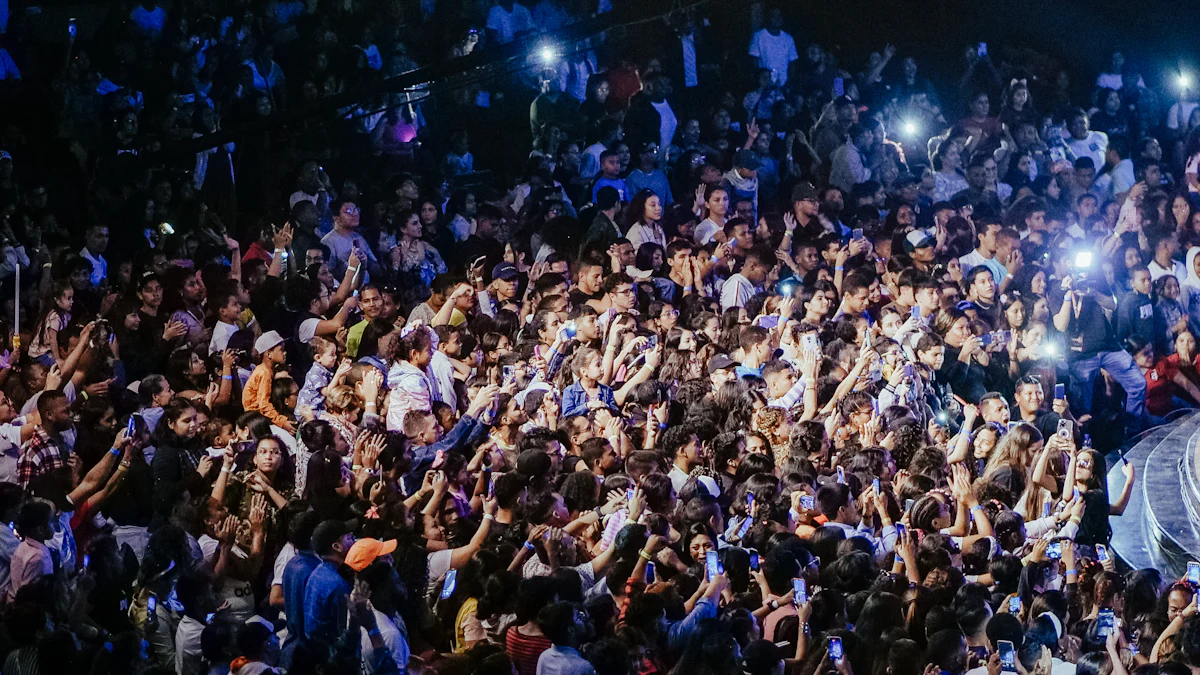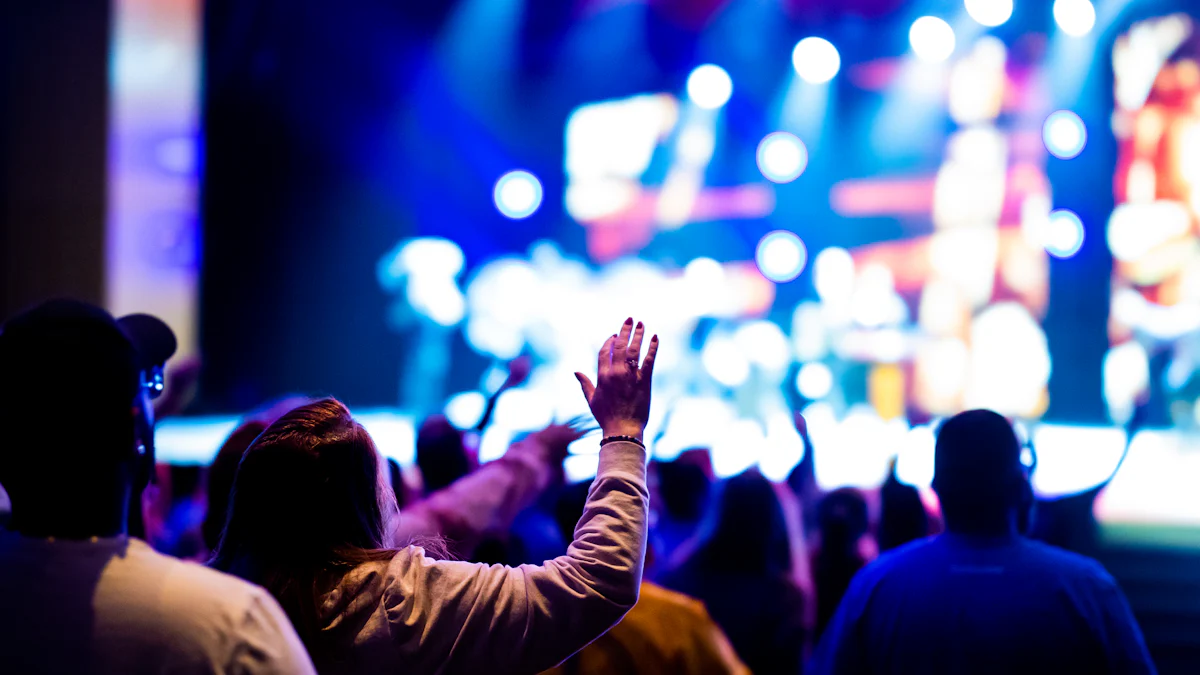10 Interactive Strategies to Boost Audience Participation in 2025

Have you ever attended an event that felt more like a lecture than an experience? Audience participation is the secret ingredient that transforms a gathering into a truly engaging event. In 2025, innovative conference audience engagement ideas are taking center stage, making conferences more dynamic than ever. From mobile-first approaches to immersive AR/VR experiences, these innovations are reshaping audience engagement. Imagine using interactive content like live polls or gamified quizzes to spark real-time connections. These strategies don’t just entertain—they create a positive event experience that leaves a lasting impression. Ready to explore how you can captivate your audience? Let’s dive in!
Pre-Event Conference Audience Engagement Ideas

Personalized Invitations with Interactive Elements
First impressions matter, and your invitation sets the tone for your event. Why not make it unforgettable? Adding interactive elements to your invitations can spark excitement and curiosity. For instance:
- Use augmented reality (AR) to create a fun, immersive experience. Imagine your audience scanning the invite to see a 3D preview of the venue or agenda.
- Include a short video message from the keynote speaker. It adds a personal touch and builds anticipation.
- Add scratch-off panels for surprises like discount codes or exclusive content.
- Incorporate QR codes that link to event details or even a live poll. This gets your audience involved right away.
Balancing aesthetics with functionality is key. A visually appealing design with clear, user-friendly interactive features ensures your invitation stands out. Personalization also plays a big role. Tailor the content to your audience’s preferences to make them feel valued.
Event Apps for Pre-Event Networking
Interactive event apps are game-changers for pre-event engagement. These apps let your audience connect before the event even begins. Features like matchmaking quizzes and interest-based chat rooms help attendees find like-minded individuals. This creates a sense of community early on.
Want to build excitement? Try social media challenges or photo contests tied to your event theme. You could also host a “Meet the Speakers” series. Interactive webinars with Q&A sessions let attendees engage directly with speakers. It’s a great way to foster connections.
Gamify the registration process too. Offer rewards for early sign-ups or completing app activities. This motivates your audience to participate and keeps them engaged.
Pre-Event Polls to Shape Interactive Event Content
Polls are a simple yet powerful tool to involve your audience in shaping the event. They give you insights into what your attendees want, helping you craft interactive event content that resonates. Here’s a quick breakdown of effective poll types:
| Type | Description |
|---|---|
| Quantitative | Collect numerical data to identify trends and patterns. |
| Qualitative | Understand opinions and feelings for deeper insights into audience behavior. |
| Binary | Use yes/no questions for quick feedback, though they may lack depth. |
For example, you could ask your audience to vote on breakout session topics or suggest questions for panel discussions. This not only makes them feel heard but also ensures your event content aligns with their interests.
Interactive Strategies During the Event

Live Polling and Q&A for Real-Time Audience Participation
Want to keep your audience on the edge of their seats? Live polling and Q&A sessions are your go-to tools for sparking interaction. These features let you connect with attendees in real time, making them feel like active participants rather than passive listeners.
Here’s why live polling tools are a game-changer:
| Benefit | Description |
|---|---|
| Increased Audience Engagement | Live polling boosts interaction, giving attendees a voice during the event. |
| Real-Time Feedback | You can gather valuable insights instantly, helping you adapt on the fly. |
| Encouraged Participation | These tools make it easy for everyone to join in, even those who might be shy. |
Dynamic Q&A segments take this a step further. They allow attendees to ask questions and share thoughts, creating a two-way dialogue. You can even use real-time polling to prioritize the most popular questions. This keeps the conversation relevant and engaging.
Gamification to Motivate Engagement
Gamification isn’t just for apps and games—it’s a powerful way to drive attendee engagement at events. By turning participation into a fun challenge, you can motivate your audience to interact more.
Here are some proven techniques:
- Nike+ Campaign: Turn activities into competitions with points and awards.
- Progress Indicators: Use bars or checklists to show progress, encouraging attendees to complete tasks.
- Interactive Challenges: Create scavenger hunts or trivia games tied to your event theme.
Platforms like Duolingo and Fitbit have shown how gamification can boost interaction. Imagine awarding badges for attending sessions or completing interactive challenges. This not only keeps your audience engaged but also adds an element of fun to the event.
Breakout Sessions for Focused Discussions
Breakout sessions are perfect for diving deep into specific topics. These smaller, interactive sessions encourage active participation and foster meaningful connections.
Why should you include them?
- They create opportunities for networking and collaboration.
- Attendees can ask questions and share insights, enriching the learning experience.
- Activities like trivia or hands-on workshops make these sessions more engaging.
Virtual events can also benefit from breakout sessions. Use them to facilitate interaction among remote participants. Whether in-person or online, these sessions break the monotony of traditional presentations and keep your audience energized.
Pro Tip: Tailor breakout sessions to your audience’s interests. This ensures maximum participation and value for everyone involved.
Immersive AR/VR Experiences
Imagine stepping into a virtual conference room or exploring an event venue without leaving your chair. Immersive AR/VR experiences are revolutionizing how you engage with your audience. These technologies create a fully interactive environment that captivates and excites.
With AR, you can overlay digital elements onto the real world. For example, attendees can scan a code to view 3D models of products or navigate the venue with virtual guides. VR takes it a step further by transporting your audience into a completely virtual space. They can attend keynote speeches, participate in workshops, or even network in a virtual lounge.
Why does this matter? It’s all about creating memorable moments. Immersive experiences make your audience feel like they’re part of something extraordinary. They’re not just watching—they’re interacting. This level of engagement keeps them focused and invested in your event.
You don’t need a massive budget to get started. Simple AR features, like interactive maps or augmented name tags, can make a big impact. For VR, consider hosting a virtual tour or creating a gamified experience. These tools make your event more accessible, especially for remote attendees.
Pro Tip: Offer tutorials or demos to help your audience navigate AR/VR tools. This ensures everyone can participate fully in the experience.
Social Media Engagement with Event-Specific Hashtags
Social media is your secret weapon for boosting audience participation. Event-specific hashtags make it easy for attendees to connect, share, and engage. A catchy hashtag creates a sense of community and keeps the conversation going long after the event ends.
Encourage your audience to use the hashtag by hosting fun challenges. Ask them to share photos, post takeaways, or answer interactive questions. You can even reward the most creative posts with prizes. This keeps your audience excited and involved.
Live updates are another great way to use hashtags. Share behind-the-scenes moments, speaker highlights, or audience reactions in real time. This makes your event feel dynamic and inclusive.
Don’t forget to monitor the hashtag. Respond to posts, answer questions, and highlight standout contributions. This two-way interaction shows your audience that their voices matter.
Tip: Promote your hashtag before the event. Include it in invitations, event apps, and on-site materials to maximize participation.
Post-Event Audience Engagement Strategies
Sharing Event Highlights and Key Takeaways
Your event may have ended, but the conversation doesn’t have to stop there. Sharing highlights and key takeaways keeps your audience engaged and helps them relive the best moments. Start by creating a recap video. Include snippets of keynote speeches, breakout sessions, and audience reactions. A short, visually appealing video can spark memories and encourage attendees to share it with others.
You can also create a blog post or infographic summarizing the event’s main points. Focus on actionable insights or memorable quotes from speakers. This not only reinforces the value of your event but also provides a resource attendees can refer back to.
Don’t forget to leverage social media. Post photos, testimonials, or even a “Top 5 Moments” list. Encourage your audience to share their own experiences using your event hashtag. This keeps the buzz alive and strengthens your community.
Tip: Send a follow-up email with links to the highlights. Make it easy for your audience to access and share the content.
Post-Event Surveys for Feedback
Feedback is gold when it comes to improving future events. Post-event surveys are one of the most effective ways to gather it. Keep your survey short and focused to increase completion rates. Use simple, clear language to avoid confusion.
Here are some questions you can include:
- How happy are you with your experience?
- What did you like about the event?
- What, if anything, did you dislike about the event?
- How likely are you to recommend this event to others?
- What events would you like to see in the future?
Timing is everything. Send your survey within 24 to 48 hours after the event while it’s still fresh in their minds. Once you’ve collected the responses, analyze the data and act on it. Let your audience know how their feedback will shape your next event. This shows you value their input and builds trust.
Building a Community for Continuous Interaction
Why let the connection end when the event does? Building a community ensures your audience stays engaged long after the event. Social media is a great place to start. Share stories, behind-the-scenes content, or even educational posts like tutorials or webinars. Regular posting keeps your audience interested and creates a reliable presence.
Interactive content works wonders too. Polls, quizzes, or “ask-me-anything” sessions encourage participation and make your audience feel involved. You can also host networking events or themed Q&A sessions where attendees can connect with experts.
Workshops are another fantastic option. Hands-on sessions provide practical skills and keep your audience coming back for more. The key is consistency. When you engage regularly, you create a space where your audience feels valued and excited to participate.
Pro Tip: Use storytelling to connect emotionally. Share customer success stories or team introductions to make your community feel more personal.
Interactive strategies are the secret to creating events that your audience will remember. They don’t just boost participation—they build connections, spark creativity, and leave lasting impressions. Activities like gamified challenges, breakout sessions, and live polls make your audience feel involved and valued. These approaches foster collaboration and create a sense of community that extends beyond the event.
Technology plays a huge role in shaping these experiences. From AR/VR tools to event apps, it streamlines processes and makes every stage of your event more engaging. With 53% of marketers agreeing that events drive sales better than awareness campaigns, it’s clear that tech-driven strategies are the future.
So, why wait? Start planning your next event with these ideas in mind. By combining creativity and technology, you’ll deliver an experience your audience won’t forget.
FAQ
What are the benefits of using interactive strategies at events?
Interactive strategies make your audience feel involved. They boost engagement, create memorable experiences, and encourage networking. These techniques also help you gather real-time feedback and insights, making your event more dynamic and impactful.
How can I incorporate gamification into my event?
Start small! Use leaderboards, badges, or challenges tied to event activities. For example, award points for attending sessions or participating in polls. Gamification adds fun and motivates attendees to stay engaged.
Do I need expensive technology for AR/VR experiences?
Not at all! Simple AR tools like interactive maps or QR codes can work wonders. For VR, consider virtual tours or basic 3D environments. These options are budget-friendly and still create immersive experiences.
How do I encourage attendees to use event-specific hashtags?
Promote your hashtag everywhere—on invites, apps, and during sessions. Run contests or challenges that require hashtag use. Reward creativity with prizes to keep the buzz alive.
What’s the best way to collect feedback after an event?
Use short surveys with clear, focused questions. Send them within 24-48 hours while the event is fresh in attendees’ minds. Tools like Google Forms or event apps make it easy to gather and analyze responses.
Tip: Let attendees know how their feedback will shape future events. This builds trust and loyalty.
See Also
10 Essential Strategies for Engaging Audiences in 2025
20 Engaging Activities to Captivate Your Audience in 2025
Effective Ways to Connect with Large Audiences in 2025
